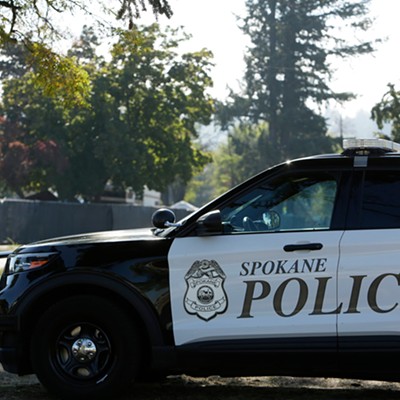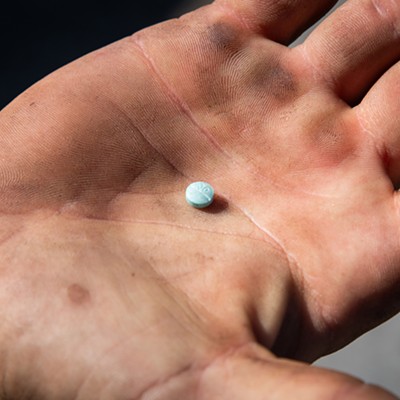In Brief
[
{
"name": "Broadstreet - Instory",
"insertPoint": "5",
"component": "25846487",
"requiredCountToDisplay": "5"
},{
"name": "Broadstreet - Instory",
"insertPoint": "10",
"component": "25846487",
"requiredCountToDisplay": "10"
},{
"name": "Broadstreet - Instory",
"insertPoint": "15",
"component": "25846487",
"requiredCountToDisplay": "15"
},{
"name": "Broadstreet - Instory",
"insertPoint": "20",
"component": "25846487",
"requiredCountToDisplay": "20"
}
]
by Inlander Staff
Sharing the Aquifer -- SPOKANE -- The Gonzaga University School of Law is hosting a one-day conference on the law of the aquifer on Sept. 19. The Spokane-Rathdrum Aquifer is the main source of drinking water for about 400,000 people living in both Idaho and Washington. And over the past couple of years, residents, environmentalists and lawmakers have fought over who exactly is in charge of the aquifer.
At this conference, managers and representatives from local aquifer-protection programs, along with experts on the issues of aquifer protection, will share their views on water rights -- and it's not just lawyerspeak.
"No, in fact we designed the conference so it would be accessible for non-lawyers," says Rachel Paschal Osborn, a local water rights attorney and the program chair. "Many people around here are interested in how the aquifer is managed; most of them are not lawyers."
The building of power plants with large water needs on the Rathdrum Prairie has been one of the most hotly debated issues.
"One of the topics we are going to be dealing with has to do with how the aquifer has been managed in the past," says Osborn. "From there, we are going to transition into water rights. We want to provide a comparison on how the two states differ on how they administer water rights."
Finally, there will be a panel discussion featuring Douglas S. Kenney, Ph.D., research associate at the Natural Resources Law Center, at the University of Colorado School of Law in Boulder.
"We've brought in some people with some expertise as to how interstate water agreements are managed in other places in the nation," says Osborn, who has represented Friends of the Aquifer in previous water rights hearings.
The Law of the Aquifer opens at 8 am on Sept. 19 and runs through 5 pm, at the Barbieri Moot Courtroom, at Gonzaga's School of Law, 721 N. Cincinnati. Cost: $25-$150. Must preregister. Call: 323-3704.
City Forum Kickoff -- SPOKANE -- The city forum -- a series of speakers and presentations hosted by First Presbyterian Church -- is meeting for the first time this season on Wednesday.
Bruce Eldredge, the executive director of the Northwest Museum of Arts and Culture, will be speaking about museums of the future, exploring old versus new museums and talking about the double position the MAC holds as both a private organization and a state agency.
This year, the city forum's theme is Creating Opportunities.
"We like to say that it's a civic dialogue on what makes a good city," says Judy Clemenson, City Forum organizer. "We try to get speakers who can talk about issues that have an impact on Spokane."
On Oct. 16, Monica Walters, executive director of the YWCA, will be speaking on peace, justice and dignity for all people; on Nov. 13, Tony Campolo, professor emeritus of sociology from Eastern College in Pennsylvania, will be speaking on how churches are saving our cities.
"We try to get people in here who are relatively neutral, but very knowledgeable in their fields," says Clemenson. "We want to derive good ideas -- not incite controversy."
Eldredge speaks on Wednesday, Sept. 18, from 11:45 am-1 pm at First Presbyterian Church, 318 S. Cedar St. Must preregister. Cost: $8.50, includes lunch. Call: 777-1555.
Spray Notification -- SPOKANE -- The Children's Pesticide Right to Know Act, which requires that school districts provide annual notices describing when and where areas in and around schools will be sprayed with pest and herbicides, took effect at the beginning of this school year.
Actually having the law on the books is not going to make a big difference for Spokane Public Schools.
"We've had what's called an integrated pest management program in place for a number of years now," says John Mannix, Spokane Public School's executive director of facilities. "In April of each year, the schools get notice of the spray schedule and we remind the principals to send a notice home ahead of time." This notice must be given 48 hours ahead of spraying.
People for Environmental Action and Children's Health (PEACH) has long educated local parents about the potential dangers herb and pesticides can have on children. The group issues a statement saying it hopes parents and school staff will use the act to protect themselves against chemical exposure.
"We also do many other things to control pests and weeds, before we spray," says Mannix. "We use landscape fabric and certain natural predators to get rid of specific bugs. When we spray, we use the least harmful product that will get the job done."
Sharing the Aquifer -- SPOKANE -- The Gonzaga University School of Law is hosting a one-day conference on the law of the aquifer on Sept. 19. The Spokane-Rathdrum Aquifer is the main source of drinking water for about 400,000 people living in both Idaho and Washington. And over the past couple of years, residents, environmentalists and lawmakers have fought over who exactly is in charge of the aquifer.
At this conference, managers and representatives from local aquifer-protection programs, along with experts on the issues of aquifer protection, will share their views on water rights -- and it's not just lawyerspeak.
"No, in fact we designed the conference so it would be accessible for non-lawyers," says Rachel Paschal Osborn, a local water rights attorney and the program chair. "Many people around here are interested in how the aquifer is managed; most of them are not lawyers."
The building of power plants with large water needs on the Rathdrum Prairie has been one of the most hotly debated issues.
"One of the topics we are going to be dealing with has to do with how the aquifer has been managed in the past," says Osborn. "From there, we are going to transition into water rights. We want to provide a comparison on how the two states differ on how they administer water rights."
Finally, there will be a panel discussion featuring Douglas S. Kenney, Ph.D., research associate at the Natural Resources Law Center, at the University of Colorado School of Law in Boulder.
"We've brought in some people with some expertise as to how interstate water agreements are managed in other places in the nation," says Osborn, who has represented Friends of the Aquifer in previous water rights hearings.
The Law of the Aquifer opens at 8 am on Sept. 19 and runs through 5 pm, at the Barbieri Moot Courtroom, at Gonzaga's School of Law, 721 N. Cincinnati. Cost: $25-$150. Must preregister. Call: 323-3704.
City Forum Kickoff -- SPOKANE -- The city forum -- a series of speakers and presentations hosted by First Presbyterian Church -- is meeting for the first time this season on Wednesday.
Bruce Eldredge, the executive director of the Northwest Museum of Arts and Culture, will be speaking about museums of the future, exploring old versus new museums and talking about the double position the MAC holds as both a private organization and a state agency.
This year, the city forum's theme is Creating Opportunities.
"We like to say that it's a civic dialogue on what makes a good city," says Judy Clemenson, City Forum organizer. "We try to get speakers who can talk about issues that have an impact on Spokane."
On Oct. 16, Monica Walters, executive director of the YWCA, will be speaking on peace, justice and dignity for all people; on Nov. 13, Tony Campolo, professor emeritus of sociology from Eastern College in Pennsylvania, will be speaking on how churches are saving our cities.
"We try to get people in here who are relatively neutral, but very knowledgeable in their fields," says Clemenson. "We want to derive good ideas -- not incite controversy."
Eldredge speaks on Wednesday, Sept. 18, from 11:45 am-1 pm at First Presbyterian Church, 318 S. Cedar St. Must preregister. Cost: $8.50, includes lunch. Call: 777-1555.
Spray Notification -- SPOKANE -- The Children's Pesticide Right to Know Act, which requires that school districts provide annual notices describing when and where areas in and around schools will be sprayed with pest and herbicides, took effect at the beginning of this school year.
Actually having the law on the books is not going to make a big difference for Spokane Public Schools.
"We've had what's called an integrated pest management program in place for a number of years now," says John Mannix, Spokane Public School's executive director of facilities. "In April of each year, the schools get notice of the spray schedule and we remind the principals to send a notice home ahead of time." This notice must be given 48 hours ahead of spraying.
People for Environmental Action and Children's Health (PEACH) has long educated local parents about the potential dangers herb and pesticides can have on children. The group issues a statement saying it hopes parents and school staff will use the act to protect themselves against chemical exposure.
"We also do many other things to control pests and weeds, before we spray," says Mannix. "We use landscape fabric and certain natural predators to get rid of specific bugs. When we spray, we use the least harmful product that will get the job done."



















